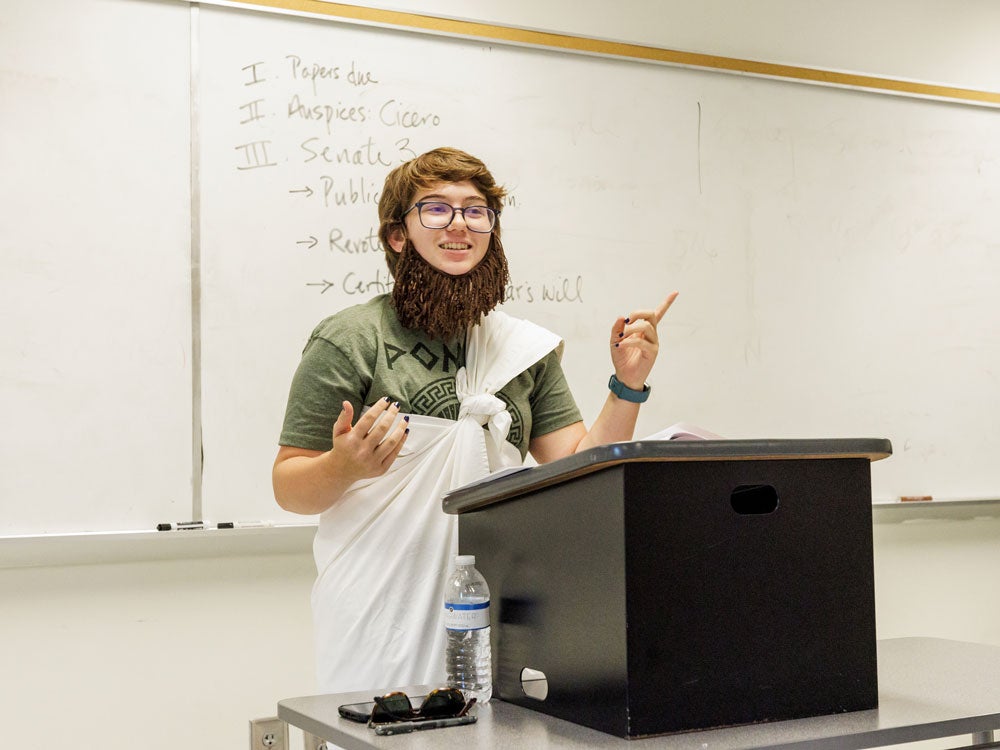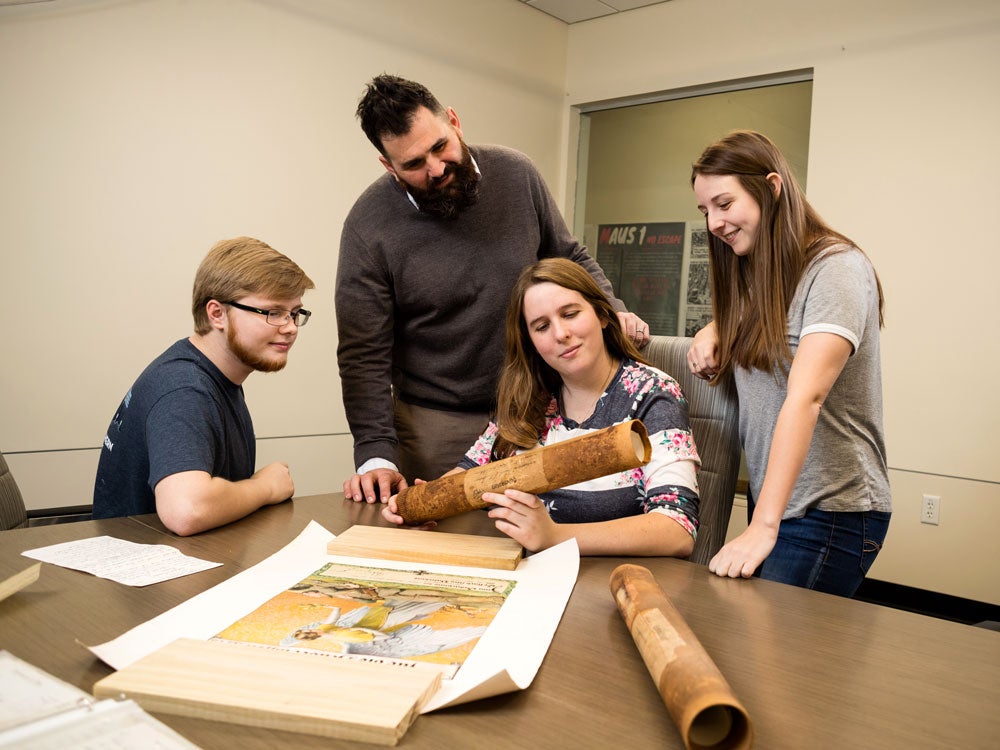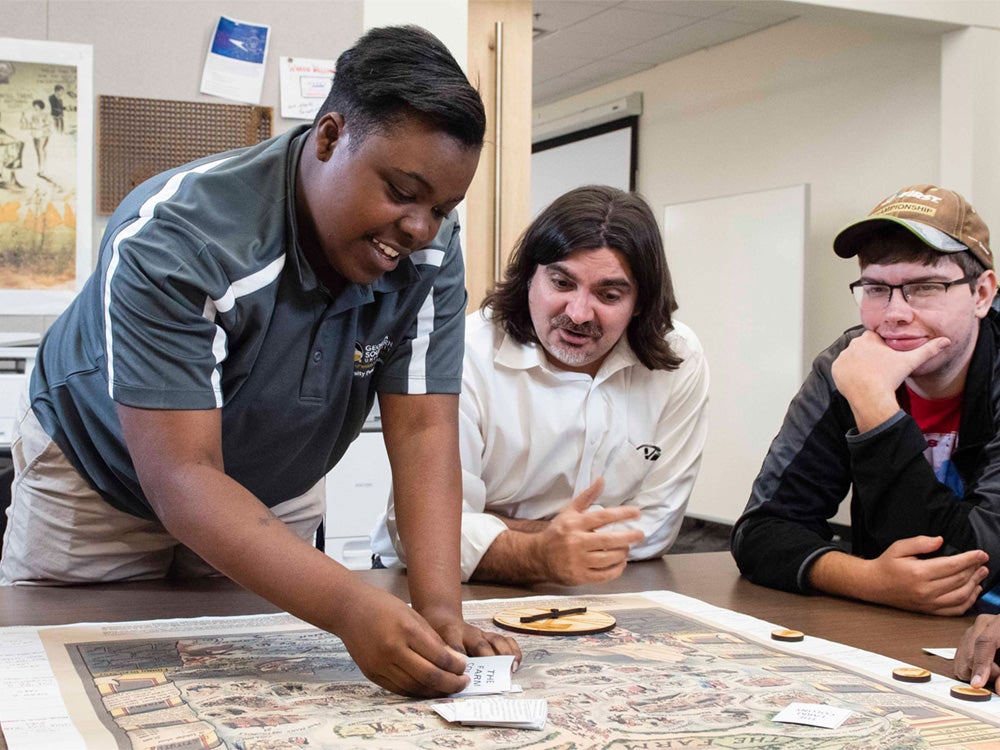Deepen your understanding of the past and sharpen your analytical skills. Designed for aspiring historians, educators, and professionals, our program offers enriching and flexible coursework that allows you to explore diverse historical topics while preparing to advance your career or continue your academic pursuits.
Locations
- Statesboro Campus
Why Get your Master’s in History at Georgia Southern?
Pursuing your master’s in history at Georgia Southern gives you the opportunity to deepen your understanding of the past while sharpening the skills you need to thrive in a wide range of career paths.
With one of the largest history faculties in Georgia, our program provides a diverse curriculum covering everything from American and European history to specialized topics like public history, military history, and gender studies. Whether you choose the thesis or non-thesis track, you’ll have the flexibility to tailor your studies to your unique career goals, getting hands-on experience through internships, research, and opportunities in museum studies and archival work.
At Georgia Southern, the MA in history takes you beyond traditional coursework, encouraging you to engage critically with complex historical issues and develop advanced research and communication skills. The program is designed to prepare you for doctoral studies, careers in education, public history, or roles in government and the private sector. By studying with our experienced faculty and accessing specialized resources, you’ll be well-equipped to make a meaningful impact in your chosen field, bringing historical insight to contemporary challenges.
Ready to Apply?
What Can You Do With a Master’s Degree in History?
With the advanced research and analytical skills you earn in this program, you can pursue roles in education, cultural preservation, and public history – roles like museum curation, archival management, or historical consulting. A master’s in history also prepares you to launch or advance a career in law, government, and business, where historical insight and critical thinking increase your proficiency in policy analysis, strategic planning, and project management. Whether your path leads to shaping public narratives or informing corporate decisions, this degree will position you to make a meaningful impact across industries.
Where our graduates work:
- Academia
- Publishing
- Journalism
- Film and Television
- Law firms
- Museums
- News and media
- Government
What our graduates do:
- Archivist
- Curator
- Museum Specialist
- Judge/Arbitrator
- College Professor
- Historian
- Business Analyst
- Journalist/Writer
What You’ll Learn
Deepen your understanding of the past by closely examining diverse time periods, regions, and specialized historical themes.
Your history coursework in our master’s program will span topics from general to specific, offering hands-on experiences in public history, museum studies, and oral history. You’ll develop critical skills in research, analysis, and communication as you engage with primary sources and historical debates.
Our program’s flexible structure lets you tailor your studies to your particular career goals, whether you choose the thesis track to produce original research or the non-thesis option for a more coursework-focused path.
Build Your Experience
Enrich your Master’s studies with concentrated, integrated programs and engaging project work.

Concentration in Public History
While earning your MA in History, you’ll be able to complete the general MA track (thesis or non-thesis option) or pursue a concentration in Public History. The concentration offers a comprehensive and engaging curriculum:
Core Courses: Includes ‘Historian’s Craft,’ ‘Graduate Seminar in Public History’ and a ‘Research Prospectus.’
Practical Experience: Gain hands-on experience with a ‘Professional Internship in Public History.’
Project Work: Undertake a ‘Non-Thesis Project in Public History’ with an oral defense.
Electives: Choose four public history elective courses at the 5000 level or above.
Credit Hours: The total program is 33 credit hours.
Learn More

Public History Graduate Certificate
The Public History Graduate Certificate at Georgia Southern University offers focused training in public history:
Core Courses: Engage in foundational courses like ‘Introduction to Public History’ and ‘Museum Studies.’
Electives: Choose from a variety of electives to broaden your understanding.
Capstone Project: Conclude with a professional internship or a non-thesis project.
Flexible Schedule: Ideal for working professionals or students seeking specialized knowledge.
This certificate provides practical skills for careers in museums, archives, and cultural heritage sites.
Learn More

Master’s and Certificate Pathway
Combining the Public History Graduate Certificate with the Master’s program at Georgia Southern University offers an integrated educational experience:
First Year: Focus on core history courses, including ‘The Historian’s Craft,’ and begin public history electives.
Summer Term: Take the opportunity to complete an internship or additional electives.
Second Year: Continue with advanced public history courses and electives.
Final Semester: Complete a non-thesis project in public history as a capstone to your studies.
This approach maximizes your learning and professional development in the field of public history.

Get Involved
Plug in to an established history organization and join the ongoing conversations, queries, and discoveries of your history predecessors and peers.
American Historical Association
Organization of American Historians
The Society for Military History
Southern Historical Association
Georgia Association of Historians
Phi Alpha Theta National
World History Association
H-Net
National Coalition for History
National Council on Public History

After Your Master’s
If you choose to continue with graduate work beyond your MA, you should know about a policy adopted by the Council of Graduate Schools:
Acceptance of an offer of financial support (such as a graduate scholarship, fellowship, traineeship, or assistantship) for the next academic year by a prospective or enrolled graduate student completes an agreement that both student and graduate school expect to honor. In that context, the conditions affecting such offers and their acceptance must be defined carefully and understood by all parties. Students are under no obligation to respond to offers of financial support prior to April 15.” For more information, see the full policy.
Applying to PhD Programs
Helpful information on how to approach applications to doctoral programs and careers in the history profession can be found through the following resources:
The American Historical Association’s Resources for Graduate Students
The American Historical Association’s Careers in Public History section
Jobs Outside Academia
There are a number of links that can help graduates plan non-academic careers as a historian:
Museums: American Association of Museums
Archives: Society of American Archivists; National Council on Public History; Society for History in the Federal Government
Historical Societies: American Association for State and Local History
Federal, State, and Local Government Employment: 50statejobs
Take Action
Follow these steps to complete the Georgia Southern application:
- Create an application account.
- Complete our online application using the PIN you received after creating your application account.
- Once complete, pay the $30 application fee or upload a valid fee waiver. Previous Georgia Southern applicants and dual enrollment students do not need to pay the fee.
You can check your application status at My.GeorgiaSouthern.edu/admissions three days after completing your application. This page contains live information about your admission status, including a checklist of missing documents we need to make a decision.
Apply to the Master's program Transfer to Georgia SouthernIf you’re interested in the Master’s program in History at Georgia Southern University, these are the key admission requirements:
- Bachelor’s Degree: A completed Bachelor’s degree from an accredited college.
- GPA Requirements: A minimum of 3.0 GPA on all undergraduate work, with a 3.0 in history and no grade below a “C.”
- History Background: An undergraduate major or equivalent in history. If your major is in another field, you need at least 15 credits in history and 30 credits in social sciences and humanities.
- Letters of Recommendation: Two recommendation letters from professors or instructors familiar with your academic abilities.
- Statement of Purpose: A 500-750 word narrative explaining how the program aligns with your career goals.
- Writing Sample: A scholarly writing sample of at least 1250 words with citations.

Take the Next Step
Ready to deepen your understanding of the past and sharpen your analytical skills? Learn more about earning your Master’s Degree in History at Georgia Southern University.
Contact Us
Dr. Alan Downs
Director, Graduate Studies
Department of History
P.O. Box 8054
Georgia Southern University, Statesboro, GA 30460-8054
Phone: 912-478-0242
acdowns@georgiasouthern.edu
Dr. Julie de Chantal
Public History Coordinator
Department of History
P.O. Box 8054
Georgia Southern University,
Statesboro, GA 30460-8054
Phone: 912-478-4478
jdechantal@georgiasouthern.edu




